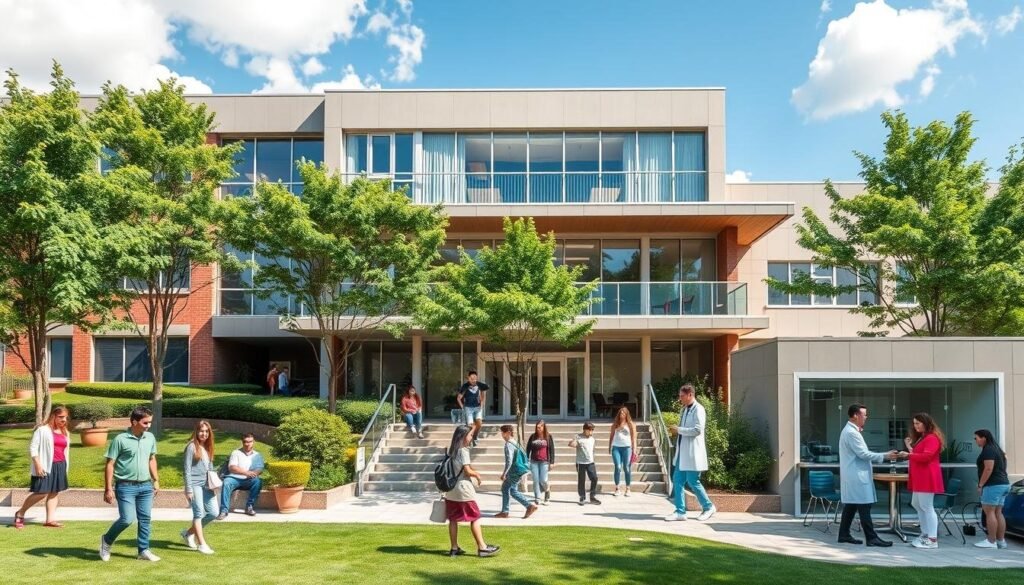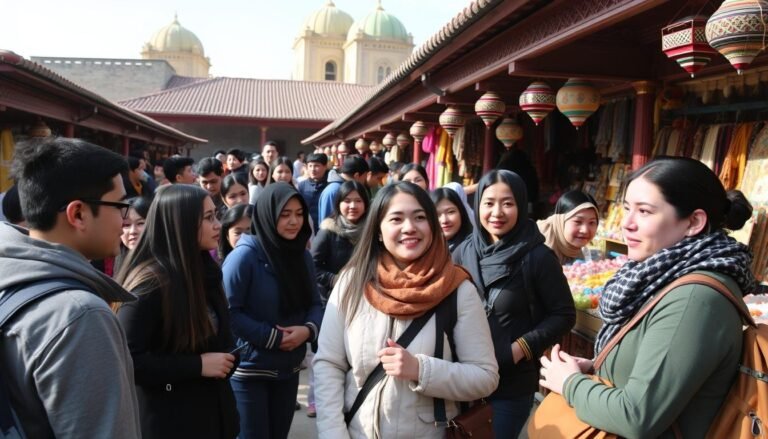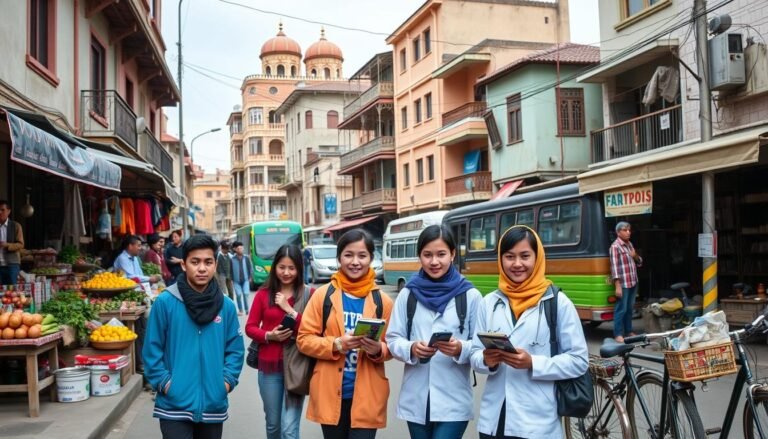Medical Facilities for Students in Uzbek Universities
Uzbekistan’s universities offer top-notch medical care for students. This is crucial for international students considering study in Central Asia. Let’s explore the exceptional healthcare resources available at Uzbekistan’s leading universities.
Uzbekistan boasts several premier medical colleges with excellent student healthcare services. The Tashkent Medical Academy, founded in 2005, is a standout institution. It has branches in Urgench, Fergana, and Termez.

This renowned academy hosts over 4,662 students, including many international learners. It’s particularly popular among Indian students. The academy’s 58 academic departments focus on practical skills acquisition.
The National Medical Commission (NMC) and World Health Organization (WHO) recognize the Tashkent Medical Academy’s excellence. This recognition highlights its commitment to quality education and healthcare.
Overview of Healthcare Services for Students
Uzbekistan’s universities offer top-notch medical care for students. The Tashkent Medical Academy provides modern facilities. These include practical skills centers and advanced training labs.
Importance of Student Medical Care
Student health is a key focus for Uzbekistan’s universities. Good medical care supports academic success and personal growth. Universities aim to create an environment where students can thrive.
Scope of Services Offered
- General primary care, including diagnosis and treatment of common illnesses
- Preventive healthcare, such as routine check-ups and immunizations
- Specialized medical services, including gynecology, dentistry, and mental health counseling
- Emergency care and first-aid assistance
- Health education and awareness programs
Accessibility of Medical Facilities
Uzbekistan’s universities make medical facilities easy to access. These are often on campus or nearby. This ensures students can get care without disrupting their studies.
Universities also provide language support for international students. They strive to be culturally sensitive to meet diverse needs.
Types of Medical Facilities Available
Uzbekistan offers various medical facilities for university students. These include campus clinics, local hospitals, and private practices. This network supports students’ health needs throughout their academic journey.
University Health Clinics
Campus clinics are often students’ first stop for medical care. They provide basic health services and referrals when needed. These clinics offer quick access to medical support for students.
Local Hospitals and Specialized Care
Uzbekistan has many local hospitals and specialized care centers. These facilities offer advanced medical services for students. They provide diagnostic tests and treatments for various health conditions.
Medical schools like Samarkand State Medical University contribute to high-quality healthcare. This ensures students receive excellent medical care during their studies.
Private Medical Practices
Uzbekistan also has a growing number of private medical practices. These offer both general and specialized healthcare services. Private options give students more flexibility in managing their health needs.
Uzbekistan’s diverse medical facilities show its commitment to student health. The country’s comprehensive healthcare network supports students’ well-being. This allows them to focus on their studies with peace of mind.
Health Insurance Options for International Students
International students in Uzbekistan need reliable health insurance. The country offers affordable insurance options compared to other nations. Medical education costs, including insurance, average 15-20 lakh INR for the entire course.
Overview of Local Insurance Providers
Uzbekistan has local insurers offering tailored plans for international students. These providers understand student needs, ensuring comprehensive coverage at reasonable rates. When choosing a plan, consider coverage scope, deductibles, and any limitations.
Importance of Health Insurance
Health insurance is vital for affordable medical care in Uzbekistan. It’s often required for university enrollment and visa applications. Without proper coverage, students may face heavy financial burdens for medical emergencies.
Coverage Details and Costs
Insurance plans for international students in Uzbekistan vary in coverage and cost. Some offer basic coverage, while others include maternity care and mental health support. Carefully review policy details to ensure the plan meets your needs and budget.
| Coverage Type | Typical Range |
|---|---|
| Medical Maximum | $200,000 to $5,000,000 |
| Deductible | $0 |
| Coinsurance (In-Network) | 80% |
| Maternity Coverage | Up to $15,000 |
| Mental Health Coverage | $50 per day (outpatient), up to $10,000 (inpatient) |
| Emergency Evacuation/Repatriation | $50,000 to $500,000 |
Understanding insurance options helps international students make smart choices. They can ensure their medical needs are covered during their studies in Uzbekistan. Proper coverage provides peace of mind and financial protection.
Preventive Care and Health Awareness
Uzbekistan universities focus on preventive care and health awareness for students. Regular check-ups and vaccinations are key parts of their medical services. These measures help catch health issues early and keep students healthy during their studies.
Regular Health Check-ups
Universities offer thorough health assessments for students. These include physical exams, blood tests, and screenings for common conditions. Regular check-ups track student health and allow for early intervention if needed.
This approach encourages students to actively manage their health. It creates a culture of preventive care in Uzbekistan’s universities.
Vaccination Programs
- Uzbekistan’s student healthcare system prioritizes vaccination programs to protect against infectious diseases.
- Universities work with local healthcare providers to offer on-campus vaccination clinics for students.
- These programs cover vaccines for flu, measles, mumps, rubella, meningitis, and more.
- By offering these preventive measures, universities help protect public health and student well-being.
Mental Health Resources
Universities in Uzbekistan provide mental health support for students’ overall well-being. They offer counseling centers, peer support networks, and mental health awareness campaigns.
These services address students’ emotional and psychological needs. They ensure students have access to comprehensive care for a successful academic experience.
Uzbekistan universities set a strong example for student healthcare. They empower students to care for their physical and mental health. This approach builds a healthier and more vibrant student community.
Emergency Medical Services in Uzbekistan
International students in Uzbekistan need to know about available emergency medical services. The country has set up comprehensive systems for quick and efficient care during crises. These services ensure prompt assistance when students face medical emergencies.
What to Do in Case of an Emergency
Stay calm and contact emergency services if you face a medical crisis. Uzbekistan’s emergency medical teams are ready to respond swiftly to urgent situations.
Contacting Emergency Services
- To reach the emergency medical services, you can dial 03 from a landline or 103 from a mobile phone.
- The emergency operators are trained to provide immediate assistance and dispatch the appropriate resources, such as ambulances and emergency response teams.
- Be prepared to provide the operator with clear and concise information about the nature of the emergency, your location, and any other relevant details that can aid in a timely response.
Hospital Procedures for Emergencies
Uzbekistan’s medical facilities can handle various emergencies. These include university health clinics and local hospitals. Hospital staff will quickly assess your condition upon arrival.
| Medical Facility | Operating Hours | Services Offered |
|---|---|---|
| MDIS Tashkent Medical Centre | Monday to Saturday, 9:00 AM to 6:00 PM (Closed on Sundays) | General medical consultations, referrals to specialists, and pathology services |
| Family Clinic | Varies by location | Non-emergent medical treatment for patients based on their permanent or temporary Tashkent residence |
Uzbekistan’s medical staff can handle complex injuries, acute illnesses, and infectious diseases. Knowing these emergency services helps you respond quickly when needed. This knowledge ensures you’re prepared for any medical situation that may arise.
Student Rights in Medical Care
Students in Uzbekistan have specific rights for medical care access. It’s crucial to know these rights and how to advocate for them. Uzbek government and universities have policies to support students’ healthcare needs.
Understanding Your Rights
Uzbekistan’s healthcare system protects student rights. We can get timely, quality medical care at university clinics or local hospitals. This includes access to general practitioners, specialists, and emergency services.
We also have the right to confidentiality for our medical information and records.
How to Advocate for Yourself
- Familiarize yourself with the medical services available on campus and in the local community.
- Speak up if you feel your rights are not being upheld or if you are unsatisfied with the care you receive.
- Work closely with university health staff to address any concerns or needs you may have.
- Understand your health insurance coverage and utilize it to access the care you require.
Resources for Assistance
There are resources to help if you have issues with medical care. Your university’s student affairs office or health services can provide guidance.
Student advocacy groups and legal aid organizations can help you navigate the healthcare system. They can also protect your rights.
| Resource | Contact Information | Services Offered |
|---|---|---|
| Uzbekistan Student Healthcare Association | info@usha.uz | Advocacy, legal assistance, educational resources |
| University Health Services | health@university.uz | Medical care, counseling, referrals |
| Tashkent Legal Aid Clinic | clinic@tla.uz | Legal advice, representation, mediation |
Knowing our rights helps us advocate for ourselves. Using available resources ensures our healthcare needs are met. This prioritizes our well-being as students in Uzbekistan.
Cultural Considerations in Healthcare
Uzbekistan’s healthcare system reflects its predominantly Muslim population. Providers often blend religious and traditional elements into patient care. Understanding these cultural norms helps international students receive appropriate and respectful care.
Navigating Healthcare as an International Student
International students may face unique challenges in Uzbek healthcare. Language barriers can be a significant obstacle. English proficiency among providers varies widely.
It’s crucial to find translation services or healthcare facilities with English-speaking staff. This ensures effective communication and proper care.
Language Barriers and Solutions
- Utilize translation services or mobile apps to bridge language gaps with healthcare providers.
- Identify healthcare facilities that have staff who can communicate in English or your native language.
- Consider bringing a trusted friend or family member who can act as an interpreter during appointments.
Local Health Norms and Practices
Understanding local health norms helps integrate into the Uzbek healthcare system. Traditional Uzbek medicine, “tabobat,” uses natural remedies and spiritual practices.
Knowing these traditional approaches can lead to better discussions with providers. It helps navigate the healthcare system more effectively.
| Traditional Uzbek Medicine Practices | Modern Healthcare Approach |
|---|---|
| Use of natural herbs and remedies | Emphasis on evidence-based Western medicine |
| Incorporation of spiritual and holistic elements | Primarily focused on physical and clinical treatments |
| Reliance on traditional healers and practitioners | Predominance of formally trained medical professionals |
Understanding Uzbekistan’s healthcare culture helps international students navigate the system effectively. It ensures they receive appropriate and respectful care during their stay.
Health Education and Awareness Programs
Uzbekistan’s universities promote health education for students. These programs equip young adults with knowledge to maintain wellbeing during and after college. Students learn essential tools for a healthy lifestyle.
Workshops and Seminars for Students
Universities host regular workshops on key health topics. These sessions cover preventive care, mental health, nutrition, and fitness. Students gain practical advice and insights for their overall wellbeing.
Collaborations with Health Organizations
Universities team up with health organizations to improve their programs. These partnerships give students access to expert knowledge and health screenings. Students can also join community health initiatives.
Accessing Educational Resources
- Universities in Uzbekistan maintain extensive libraries and online portals that offer a wealth of health-related educational resources for students.
- From informative brochures and articles to interactive multimedia content, these resources cover a diverse range of topics, including nutrition, exercise, mental health, and disease prevention.
- Students can easily access and utilize these materials to supplement their learning, fostering a culture of self-care and proactive health management.
Uzbekistan’s universities empower students through health education programs. They help students make smart choices about their health. This approach shows the country’s dedication to nurturing a healthy future generation.
Mental Health Support Services
Uzbekistan universities offer vital mental health support for students. They recognize the importance of addressing mental well-being for local and international students. This support is crucial throughout their academic journey.
Importance of Mental Health Care
Good mental health is key for students to excel academically and personally. Universities in Uzbekistan make mental health a priority. It affects students’ focus, stress management, and overall life balance.
These institutions aim to create an environment that promotes student success. They focus on personal growth through mental health support.
Availability of Counseling Services
Universities offer on-campus counseling with qualified mental health professionals. Students can access confidential one-on-one sessions, group therapy, and helpful workshops. These services help students tackle challenges and develop healthy coping skills.
All counseling services are free for students. This ensures everyone can access the support they need.
Peer Support Networks
- Universities encourage peer support networks among students.
- Student-led mental health groups create a sense of community.
- These programs provide a safe space for sharing experiences.
Uzbekistan’s universities show their dedication to students’ overall growth. They invest in comprehensive mental health support services. This approach benefits individual students and the entire academic community.
Future Developments in Student Medical Care
Uzbekistan is focusing on healthcare reforms. This will impact student medical care. The government aims to improve service delivery, health financing, and digital transformation.
Upcoming Plans for Healthcare Improvements
Uzbekistan plans to expand its healthcare initiatives nationwide. This follows the success of the Syrdarya Oblast pilot project. The expansion will increase contracted healthcare service points and inpatient care facilities.
Trends in Student Health Services
Technology is becoming a key part of student health services in Uzbekistan. The e-health system has already shown success in Syrdarya. Healthcare delivery will use age and gender factors to personalize services.
How We Can Contribute to Meaningful Change
University students can help improve Uzbekistan’s student medical care. We can provide feedback and join health awareness initiatives. Supporting innovative approaches will shape future healthcare services.
The recent Medical Olympiad is a great example of community involvement. It brought together over 100 participants from various medical universities. Such events help elevate medical education standards and find future industry leaders.





